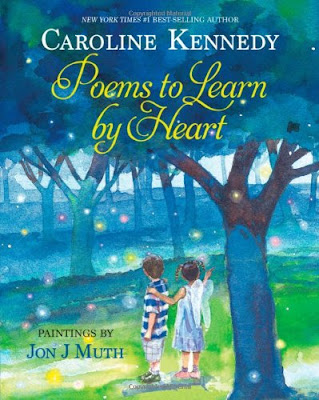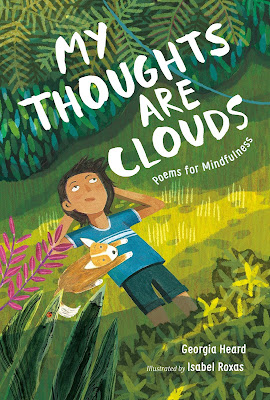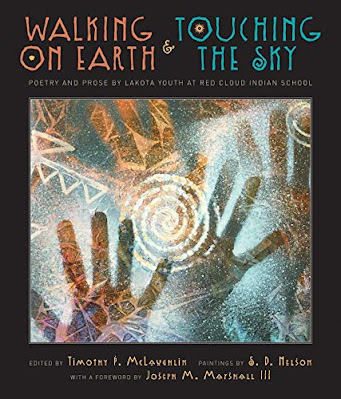Poems to Learn by Heart
Bibliography:
Kennedy, Caroline. Poems to Learn by Heart. Ill. by Jon J. Muth. Los Angeles: Disney-Hyperion, 2013. ISBN: 978-1423108054
Summary:
Poems to Learn By Heart is a diverse treasury of poems collected for readers to memorize and share. Caroline Kennedy, with the help of students from DreamYard Prep in the Bronx, has compiled an impressively broad assortment of poems ranging from complex and esoteric classics to accessible and familiar rhymes. The poems are arranged in sections by topics including poems about the self, family, friendship and love, fairies and other magical creatures, nonsense, school, sports and games, war, and nature, and the book concludes with a section entitled “Extra Credit” featuring advanced poems for memorization. Each section begins with an introduction to its theme, and Kennedy shares fascinating memorization techniques from ancient Greece and Rome, challenging the reader to push the limits of their recall and join in the tradition of bards who could recite long epic poems entirely from memory. Each poem is set to the lush watercolor paintings of Jon J. Muth, providing rich color, texture, and visual context. An index of first lines appears at the end of the collection.
Analysis:
From the introduction of Poems to Learn By Heart, Caroline Kennedy celebrates the ancient and ongoing tradition of poetry recital, citing the Greek and Roman techniques of visualizing a building with many rooms and placing poems in various mental enclaves for safekeeping. By exercising this incredible capability of the mind, the ancients were able to memorize and perform epic poems such as The Odyssey and could pass them down by oral tradition without the aid of writing. Kennedy connects this tradition with the resurgence of poetry memorization through the slam poetry movement. This emphasis on committing verse to memory continues throughout the volume in the various introductions to the thematic sections. Readers will be inspired to try out their memory skills, and there are plenty of short poems to begin with, including poems as short as this couplet from Robert Louis Stevenson: “The world is so full of a number of things, / I’m sure we should all be as happy as kings.”
Not every poem will be appealing or accessible to everyone, but readers will surely be able to find poems that will become favorites. Some of the more complex poems such as those by Percy Bysshe Shelley, William Shakespeare, and Herman Melville might leave younger readers scratching their heads, but others, especially in the section of poems about school, fairies, and friendship, are whimsical and highly accessible. Playful language and rhyme, from Ogden Nash, Shel Silverstein, and Jack Prelutsky will delight readers. Edward Anthony offers this pithy stanza: “It is the duty of the student / Without exception to be prudent. / If smarter than his teacher, tact / Demands that he conceal the fact.” Readers who take the challenge of memorization to heart will be able to start slow and graduate to more lengthy but memorable poems such as “Casey at the Bat” and “Casey’s Revenge.”
One benefit of this volume is the inclusion of classic poems and passages that are often referenced in modern culture and literature: The Gettysburg Address by Abraham Lincoln, biblical scriptures, Shakespearean sonnets, poems by William Blake, Rudyard Kipling, Tennyson, and several poets of the Harlem Renaissance, to name a few. Because the collection is geared toward memorization, a majority of the poems rhyme and have a musical, alliterative quality, and as Kennedy points out, this makes them easier to remember and recite.
As some other reviewers have pointed out, this collection is extremely broad and includes poems, especially in the section on war, with dark and challenging content such as Martin Niemöller’s poem of warning “First They Came for the Jews.” The collection is suitable for all ages, and readers who grow up with these poems will find themselves returning to its pages with renewed appreciation as they grow and mature.
The watercolor paintings by Jon J. Muth are outstanding and add texture, depth, and whimsy to the poetry, extending the poems’ meanings and drawing thematic continuity between them. Readers will appreciate how the poems float among the washes of color. The images themselves can even serve as memory aids to help readers commit these poems to heart.
Excerpt:
“Baby Ate a Microchip”
by Neal Levin
Baby at a microchip,
Then grabbed a bottle, took a sip.
He swallowed it and made a beep,
And now he’s thinking pretty deep.
He’s downloading his ABCs
And calculating 1-2-3s.
He’s memorizing useless facts
While doing Daddy’s income tax.
He’s processing, and now he thrives
On feeding his internal drives.
He’s throwing fits, and now he fights
With ruthless bits and toothless bytes.
He must be feeling very smug.
But hold on, Baby caught a bug.
Attempting to reboot in haste,
He accidentally got erased!
Activities:
- Share Caroline Kennedy’s explanations of ancient memory techniques to pique students interests in poetry recitation.
- Memorize and share a poem to model the wonders of memory.
- Challenge readers to pick a short poem to memorize and perform. Gradually increase the lengths of poems chosen for memorization, and hold a contest: Who can recite the longest poem?



Comments
Post a Comment